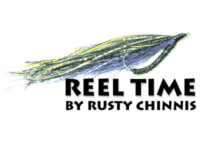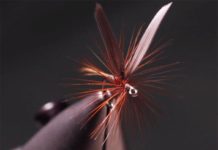Between now and the end of the year, recreational anglers who fish in the salt have a chance to influence the management practices employed by the National Oceanic and Atmospheric Administration as it works to update the National Saltwater Recreational Fisheries Policy.
It’s particularly important for recreational anglers to take the time to reach out during this process, largely because it appears that NOAA and its fisheries biologists are genuinely interested in what we have to say. NOAA went so far as to send a high-level delegation to the American Fly Fishing Trade Association dealer summit in South Carolina in October to discuss oceanic recreational fisheries directly with anglers, and the agency conducted several outreach events over the summer and through the fall in hopes of getting recreational anglers to engage. The federal agency in charge of managing oceanic recreational fishing clearly has its ears on — it wants to hear from recreational anglers about fisheries management for everything from striped bass to billfish and everything in between.
But time is short. The comment period ends Dec. 31
NOAA is updating its National Saltwater Recreational Fishing Policy that was last renovated in 2015, and, while the existing policy does address some of the most important challenges facing our recreational fish stocks, it falls short of addressing others. Over the next four weeks or so, recreational anglers have the opportunity to have an outsized impact on how our recreational fisheries are managed for years to come.
But where do we start? Well, here’s a quick primer, and we should address the elephant in the room first.
Climate Change
No issue presents a bigger challenge to saltwater recreational fisheries than climate change. If we can’t get a handle on the impacts to our fisheries from climate change and its associated stressors (think about reduced migration range, red tide fish-kills, unnatural and explosive blooms of sargassum and the general loss of fisheries habitat), there may not be a need for policy update a decade from now. Any recreational angler who blindly and stubbornly ignores climate change and the threats it poses to saltwater fishing is willfully working against his or her own best interests. The first and most important message delivered to NOAA during this comment period should focus on climate change and what can be done to make our recreational fisheries more resilient to its impacts. As it stands, there is no mention of addressing climate change in NOAA’s existing policy statement. Any new policy must be crafted with a warming world as its overarching theme.
Science First
Which brings us to science. NOAA should be considered the “umbrella” agency when it comes to recreational fishing management in our oceans. There are state agencies and regional fishing management committees up and down our coasts, but NOAA’s Saltwater Recreational Fishing Policy should be the guiding light for all other agencies that manage fisheries important to recreational anglers, and that guiding light should be science, not politics. If you want to see how well politics works in fisheries management, look no further than East Coast striped bass management and the yo-yo effect on fish stocks thanks to political efforts conducted to please the commercial fishing industry. The same could be said for West Coast groundfish management. Managing for the sustainability of our recreational fisheries, not political cachet, should be among NOAA’s highest priorities, and that means science needs to lead the way.
Angler-Sourced Data
NOAA needs to invest in more and better data collection so it can stand on solid ground when it comes to time change management policies for any given fishery. And, frankly, it’s time for recreational anglers to look in the mirror and maybe practice some introspection. If and when you comment on this policy rewrite, encourage NOAA to hold the recreational angling community accountable in the effort to collect usable data that can be used to better manage the fisheries we care about. We all have the ability, even anecdotally, to share the information we collect when we fish. It’s not too much to ask, particularly from those anglers who harvest fish from the sea, to submit reports and data to NOAA so the agency can be more nimble and manage for the sustainability of our fisheries. Presently, the Marine Recreational Information Program provides a federal-regional-state “mechanism” to harvest data, but it’s bulky and largely inaccessible to everyday recreational anglers. Improving this program and providing an easy, user-friendly interface for anglers to offer up same-day data from saltwater fishing trips is a great way to turn the average angler into a helpful citizen scientist.
We have a generational opportunity over the next month or so to influence recreational fishing management. Take the time to share your concerns with NOAA, and ensure that your voice is heard. As anglers, we’re part of a huge economic sector that includes everything from boat builders, gear and tackle manufacturers, soft-goods designers, retail outlets, destination communities, lodging establishments and the like. Ensuring our saltwater fisheries are healthy and productive goes beyond the success we, as anglers, experience when a striper hits a fly or when a redfish grabs a lure. Good fishing translates into healthy coastal economies.
This is our chance to have real influence over the fisheries so important to us and the millions of anglers who fish in saltwater. Take a few minutes and send your thoughts to NOAA. To its credit, the agency is actively seeking your input. It’s time for us to do our part and let our fisheries managers know how important our fish — and our fishing — are to us.
Credit: Source link






























